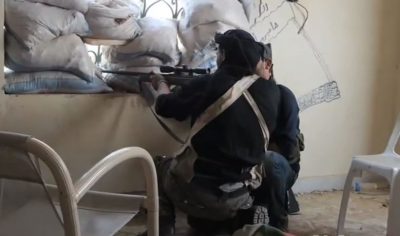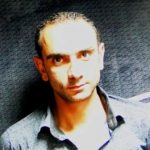By
Qosai Amamh
Corpses decompose all over the Barzeh-Al Tal highway as a number of qualified snipers remain to hunt free prey. Om Firas, a woman wearing a Hijab scarf, walks into the sunlight of the Alawi neighbourhood of Damascus, Esh Al-Warwar, and is instantly seen in clear sight by the shooting gun, exciting the sniper’s appetite to kill; he doesn’t hesitate.
Her body remains a distance from the family cemetery for fifteen days. Fifteen days are enough for some potatoes to grow on the street, then shrivel, die and turn into green lumps with black spots. These potatoes remain after the government removes Om Firas’ body with appropriate cover by the Syrian army forces and sends it to her siblings without explanation.
Om Ali saw the removal from her house window in Esh Al Warwar. She watched the corpse for two weeks, asking her son Mohanad, a military officer, to do something for it to be removed. That son himself became alone a couple months ago when his brothers passed away. Ali died in Homs, Hasan in a trap set in Hasyaa and Thaer passed away in Daraa. All of them were in the military forces, only Mohanad as colonel, surviving. Responding to his Mother’s request the Son arranged for Om Firas’ body to be removed from the road to avoid disease spreading.
It was only ten days following this that Mohanad’s body was itself moved to Safita after he was killed in battles in Jobar. Om Ali never died when she heard of her fourth son, but she finally did on hearing of her son-in-law, another military officer, passing away in Aleppo. Neighbours said that she fell as a leaf on the ground at that time and never again stood up. No doubt Barzeh Market had gathered Om Firas and Om Ali in the past, choosing good potatoes and rejecting bad ones.
The sniper is very strict at shooting the target. He chose not to kill Ahmad but instead shot him in the crotch, and he never missed that target. Ahmad will no longer know the feelings of a father, the sniper doing so creatively as if Ahmad was completely naked in the street, lying on his bed imagining that a grave is a fortune. He also doesn’t know now what to say to his girlfriend, who understands the situation, giving her some dramatic options she never before considered.
The most tragic person however was Ahmad’s father. At another point on the same road, Ali, another father living in Esh Al-Warwar who lost his son a couple months ago, was walking. His wife was an employee at a facility belonging to the military. One day on her way back from work, the bus became a target for some shooters. She called her husband on his cellphone after the second bullet entered her body to tell him the last words she could say, which were the name of a baby thrown on the ground. After that, Ali made a great effort and a lot of time to be able to get the corpses, crying rivers of tears at the burying.
Do Ahmad and Ali meet at a point? They were probably riding the same highway two years and a half ago, not knowing each other! They’ve never heard the two stories of each other, what if they ever have?
While Barzeh calms down, Esh Al-Warwar continues on fire. This district, which is now out of control, contains a private arresting centre, where twenty seven peaceful young boys were arrested on the Hamish Highway. They were needed as hostages to be exchanged with some high value military officers who went missing in Barzeh a number of weeks ago. Private security forces, ‘Shabbiha’, took a bus and headed to the main road to kidnap the boys, the eldest of whom was twenty six. At the place of arrest, ID cards were then ruined, at the same time as a mortar bomb hit the district and an officer was killed in Al-Qusair.
All of these events make it hard for an officer not to open a cell door and hit a prisoner with all the power he can muster, a place where there are no rules, greater power or even morals. It is only then that the regime wakes up to the idea of the ‘monster’ it created and decides to shut the centre down, but those insurgents are good at evil. They only needed some papers and bullets to write fake reports about the prisoners before the security forces came to take the hostages. From this they created individuals with no limits seemingly, a ‘Salafi’ as a foreigner sneaking into the country as an armed terrorist even! The mission was then completed, every kidnapped person being sent to a security station according to his accuser, to get forgotten.
Elsewhere a butcher laughs out loud, a sound still heard by the whole town long after he is done distorting the bodies. This blows up a thousand desires: a desire of emigration, a desire of revenge, another one of getting away, the fourth of sarcasm; but the final is to survive. We both hear the sound. You and I are able tonight to figure the truth, not because we’re both angels or prophets, but because of geography which allows us to be so close to the body.



No Comments Yet!
You can be first to comment this post!